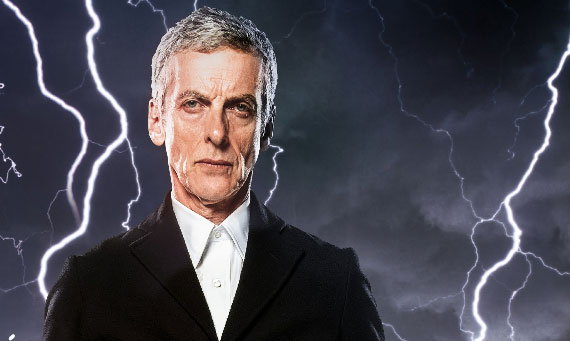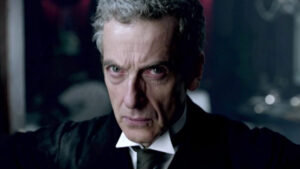Fall of the 11th: How the 12th Doctor’s Personality Came To Be
Guest contributor Dominic G. Martin analyses Twelve’s harsher edge.

The Doctor has now lived for over 2000 years and has had experiences that span that period and beyond, throughout his thirteen lifetimes. The latest incarnation has been born out of destruction and the perils of war at the hands of his mortal enemy, and as a result has appeared to be a hardened, embittered and psychologically scarred Time Lord due to his experiences, making him a more distant, and damaged individual, when compared to his immediate predecessors, and also much to the shock of the audience. I know people who were near-instantly turned off Twelve due to his more abrasive and less accessible nature.
“Now wait a second!” I hear you say. “That’s Eccleston after coming out of the Time War!” And that to an extent is a fair summation. Because lightning does strike twice, but in more graphic detail the second time.
 Like the Ninth Doctor was the result of the trauma suffered by the War Doctor throughout his tenure during the Time War, the Twelfth Doctor is the outcome of the psychological damage suffered by the Eleventh Doctor throughout his final thousand years of his life from the devastating, long, arduous war on Trenzalore.
Like the Ninth Doctor was the result of the trauma suffered by the War Doctor throughout his tenure during the Time War, the Twelfth Doctor is the outcome of the psychological damage suffered by the Eleventh Doctor throughout his final thousand years of his life from the devastating, long, arduous war on Trenzalore.
At the airing of Deep Breath, I saw some confusion and anger from fans over why Twelve acted the way he did, so naturally, I wanted to offer up my own interpretation of how Trenzalore changed the Doctor as a singular entity, and give merit to how Steven Moffat constructed and set up the evolution of the character of the Twelfth Doctor. The Doctor is still in.
Allow me to lay out everything the Eleventh Doctor had to endure on Trenzalore. From the moment he was stranded on Trenzalore, he became the defender of the planet. He fought alongside the townspeople and the Church to keep the town and his people safe. This was on a much smaller, more intimate scale than the Time War. But much like the Time War, the Daleks and multiple other races were involved.
 Now, allow me to outlay to you his scenario chronologically. Upon being trapped on this planet, one that he was already prophesied to die on, he had no one as a companion but Handles, a Cyberhead, along with the responsibility of a town to take care of. He was now the sheriff, which can be likened to his role in “A Town Called Mercy”. Time passes, and he settled into his new life. He delighted children with stories of his past adventures, and helped their parents live their lives. Time passes more so, and those children became adults in the progressively more violent environment. They became soldiers and they began to join the fight. Some of them have families of their own. Over the course of war, it would only be natural that some of them become injured in the battles with races such as the Cybermen. And they would be likely destined die in the Doctor’s name, helping him protect his own people. And while some may survive, the Doctor would still outlive them. Essentially, he would see children he befriended grow up to become adults, to become old men and women, and then to die – on a regular basis for him. And this keeps happening for dozens of generations, as he is constantly derived of any constants in his abnormally long life.
Now, allow me to outlay to you his scenario chronologically. Upon being trapped on this planet, one that he was already prophesied to die on, he had no one as a companion but Handles, a Cyberhead, along with the responsibility of a town to take care of. He was now the sheriff, which can be likened to his role in “A Town Called Mercy”. Time passes, and he settled into his new life. He delighted children with stories of his past adventures, and helped their parents live their lives. Time passes more so, and those children became adults in the progressively more violent environment. They became soldiers and they began to join the fight. Some of them have families of their own. Over the course of war, it would only be natural that some of them become injured in the battles with races such as the Cybermen. And they would be likely destined die in the Doctor’s name, helping him protect his own people. And while some may survive, the Doctor would still outlive them. Essentially, he would see children he befriended grow up to become adults, to become old men and women, and then to die – on a regular basis for him. And this keeps happening for dozens of generations, as he is constantly derived of any constants in his abnormally long life.
“It’s not like I’m an innocent. I’ve taken lives. And I got worse, I got clever. Manipulated people into taking their own. Sometimes I think a Timelord lives too long.” – The Tenth Doctor, “The End of Time”
Eventually, he would become desensitised to it and accustomed to this life. Resorting to his old ways from the Time War and tricking his enemies into taking their own lives. Sontarans with faulty cloaking devices. Weeping Angels and mirrors. Cybermen and manipulation. He became what he used to despise himself for being. The Eleventh Doctor became the War Doctor Mark II.
“Every life I save is a victory.” – The Eleventh Doctor, “Time of the Doctor”
Eventually he became older, approaching death’s door, and too weak to actively fight along with the loss of all hope, his mind falling to senility. The only friendly face he could properly trust was someone he met a millennium ago, from his former life of travel and excitement. And that is what convinces him it’s time to resign himself to that fate. The war would never end until he gave himself up.
“You were born in battle, full of blood and anger and revenge. Remind you of someone? That’s me, when we first met.” – The Tenth Doctor, “Journey’s End”
 But then he found himself granted a new lease on life. The war ended, the Time Lords safe but still lost. And then he regenerates. He becomes alive once again. But he has to live with himself and everything he did during the war. This new version of him was born in anger, and hatred against the Daleks once again. He had the guilt of one war eased, only to be replaced with the guilt of another. Only this one is permanent. He may have avoided his death, but it was at the cost of generations of lives over the near millennium. He became the monster that he worked so hard to get away from once again.
But then he found himself granted a new lease on life. The war ended, the Time Lords safe but still lost. And then he regenerates. He becomes alive once again. But he has to live with himself and everything he did during the war. This new version of him was born in anger, and hatred against the Daleks once again. He had the guilt of one war eased, only to be replaced with the guilt of another. Only this one is permanent. He may have avoided his death, but it was at the cost of generations of lives over the near millennium. He became the monster that he worked so hard to get away from once again.
Eleven was able to be happy in his parting because he knew his personal suffering was at an end. But the suffering of the entity known as the Doctor was still ongoing, and it took the regeneration to finally settle it in.
Naturally the effect of war to the psyche can be devastating. It can change them. Break them. Dictate their actions. The Twelfth Doctor is a war veteran, twice over. He is the summation of everything that was building up in the Eleventh Doctor throughout the war.
Looking at it from a psychological point of view, it wouldn’t be unheard of to align the Twelfth Doctor with having the symptoms of Post-Traumatic Stress Disorder. From the onset of the first three episodes, Twelve displays symptoms, such as emotional numbness and distance.
In episodes such as “Into the Dalek” and “Deep Breath”, One of the first symptoms is that Capaldi doesn’t display strong positive emotions. Anger, yes. Happiness? Barely. And even then only with people he is familiar with and trusting towards. Twelve’s emotions are vastly negative to begin with. He tries to deal with his self-hatred after the war by not feeling much of anything. He is emotionally distant to those he doesn’t know, and very withdrawn.
The second symptom is that Twelve also displays signs of hyperarousal, or a constant state of being on edge. This is very much the case in “Robot of Sherwood”. The Doctor is constantly suspicious, and searching for threats, making him easy to lose sight of logic. Throughout a lot of the episodes before “Kill The Moon”, he displays signs of irritability and outbursts of anger, both towards Clara and minor characters like the tramp in Deep Breath.
“Will you help me?” – The Twelfth Doctor, “Deep Breath”
 In this viewer’s humble opinion, the Twelfth Doctor has a valid reason to be damaged. The man has lost everything thanks to the War, much Nine did. But unlike Nine he doesn’t have a Rose to help him find hope and happiness again. He has a Clara to travel with sporadically. A Clara who didn’t accept who he was and had to be reassured by his previous self. Twelve knows he needs someone, but Clara very nearly wasn’t that someone.
In this viewer’s humble opinion, the Twelfth Doctor has a valid reason to be damaged. The man has lost everything thanks to the War, much Nine did. But unlike Nine he doesn’t have a Rose to help him find hope and happiness again. He has a Clara to travel with sporadically. A Clara who didn’t accept who he was and had to be reassured by his previous self. Twelve knows he needs someone, but Clara very nearly wasn’t that someone.
All this just adds to the Doctor’s mental traumas. Combined with the events of Into the Dalek, of which he saw a Dalek less than 72 hours after regenerating after destroying a whole army of Daleks. It genuinely wouldn’t surprise me if Twelve was having flashbacks to the Time AND Trenzalore wars all the way through. Hence, his hatred of them being so prominent and visible to “Rusty”.
In conclusion, to those that think that Twelve’s characterisation is too dark and negative, well to be honest I think it would be a mistake if they made him too light. It would trivialise the events of Eleven’s death, and make it just another adventure. But now we have the Doctor crippled to the point to where even his face shows how truly worn down he is.
After all the experiences that he has had, the Doctor now has to rebuild himself and re-sensitise himself, and take himself out of his own depression, which by the end of Last Christmas, is working like a charm. And with the exception of Clara, he has no one to help him but himself. But what Clara does give the Doctor is hope. A reason to keep going. Hence, why he trusts her, and her opinion of if he really is a good man. Which he most certainly is.








